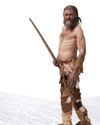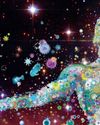Steve Jobs' Impressive, Messy Career

January 9, 2007. San Francisco, California. Steve Jobs walked onto the stage in front of a cheering crowd. Wearing his signature black turtleneck and jeans, he waited for quiet. The crowd held its breath.
“We’re going to make some history together today,” he said. Then he introduced the iPhone.
Two Sides to the Story
Steve Jobs was a hero of the tech world. But it wasn’t always this way. Jobs, the designer of some of the world’s most popular products, made serious mistakes too.
Jobs’ career spanned three decades. He changed the way people do business and connect with family and friends. But he also hurt people close to him. He cofounded Apple. It’s responsible for iPhones plus iPods, iMacs, MacBooks, and iPads. But he also lived the nightmare of being fired from his own company.
Karen Blumenthal examined the life and career of Jobs in her book Steve Jobs: The Man Who Thought Different. Through research and interviews, she learned that some people considered Jobs to be confident and creative. Others considered him stubborn and deceptive.
“A lot of people who are successful have this two-sided personality,” says Blumenthal. “Their positives are also negatives. They are so determined they will stick with something too long. But they also keep pushing until they get it right.” Do Jobs’ successes outweigh his mistakes and failings?
Key Characteristics
Jobs was demanding. He wanted things a certain way—his way. He got upset over things like the color of a typewriter or office phones. He insisted on certain design elements. Coworkers removed Jobs from some projects at Apple.
هذه القصة مأخوذة من طبعة July/August 2018 من Muse Science Magazine for Kids.
ابدأ النسخة التجريبية المجانية من Magzter GOLD لمدة 7 أيام للوصول إلى آلاف القصص المتميزة المنسقة وأكثر من 9,000 مجلة وصحيفة.
بالفعل مشترك ? تسجيل الدخول
هذه القصة مأخوذة من طبعة July/August 2018 من Muse Science Magazine for Kids.
ابدأ النسخة التجريبية المجانية من Magzter GOLD لمدة 7 أيام للوصول إلى آلاف القصص المتميزة المنسقة وأكثر من 9,000 مجلة وصحيفة.
بالفعل مشترك? تسجيل الدخول

A 12-Year-Old Girl's Election Sticker Is a Winner
VOTING IS A FUNDAMENTAL FREEDOM FOR AMERICANS, A MEANS OF DOING ONE'S CIVIC DUTY AND A WAY AN INDIVIDUAL CAN EXPRESS THEIR VOICE. In 1971, the United States lowered its voting age to 18. But that doesn't mean kids and teens under 18 can't participate in elections in various ways.

If everything the human brain does is basically sets of electrical impulses, how exactly does that translate into a state of mind?
You're not the only one asking this question. Every neuroscientist in the world is wondering the exact same thing, says Zach Mainen

EARTH'S TINIEST BUILDERS
THE HIDDEN WORLD OF MICROBES IN THE EARTH'S CRUST

MUMMIES SPEAK
ABOUT MICROBES, MIGRATION, AND MORE

GOING WITH YOUR GUT
HOW DO MICROBES AFFECT OUR HEALTH? LET'S COUNT THE WAYS...

BUG Detective
A burglar sneaks into a house on a quiet street in New York City. He walks through the house, touching countertops and door handles. Finally, he steals a single card from a full deck. Then he leaves.

Little Creatures Among Us THE MANY MICROBES IN OUR DAILY LIVES
When you think you're alone, you're actually not. In the ground, the air, your room, and even your body are Strillions and trillions of creatures so tiny you can't see them.

A Mars Rock Found With Leopard Spots Could Be a Sign of Ancient Life
IN JULY, NASA'S PERSEVERANCE ROVER CAME ACROSS A SPOTTED ROCK IN WHAT WAS ONCE A RIVERBED IN THE JEZERO CRATER ON MARS.

Para Athlete Uses Exoskeleton Suit to Carry the Olympic Torch
In July, a 36-year-old French tennis para athlete, Kevin Piette, got a chance to participate in this summer’s Olympic torch relay without using a wheelchair.

Ancient Egyptians May Have Used a Water System to Lift Stones to Build Pyramid
HOW ANCIENT EGYPTIANS BUILT THE MASSIVE PYRAMIDS IN EGYPT MORE THAN 4,000 YEARS AGO HAS LONG BEEN A TOPIC OF WONDER AND DEBATE.